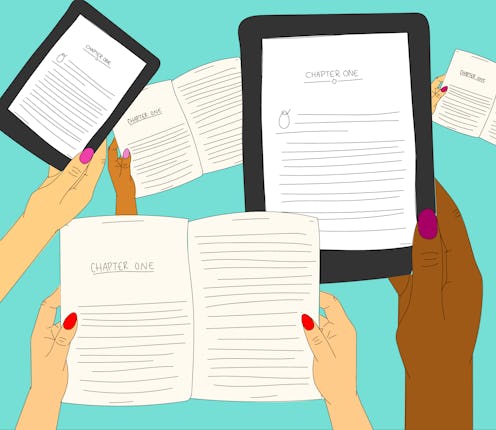Books
The Value of Reading on Paper

Print isn't dead, and in fact, it may be more valuable than ever. Preliminary research by two professors at West Chester University shows that when it comes to reading comprehension, children retain more information from print books than from ebooks.
A large part of this loss of comprehension happens because ebooks for kids are just too interactive. It doesn't take a scientist to realize that the presence of moving text, sound effects, and digital "Easter eggs" hidden on every page provide easy distraction from reading — especially if you're young, and reading is hard, and clicking on blinking objects is very easy. It's not surprising, then, that the researchers found that children "often skipped over the text altogether, engaging instead with the books’ interactive visual features." The moral of the story? Parents, help your children stay on track during reading time — and opt for ebooks without interaction overload.
Unfortunately, parents are losing out in the reading comprehension game, too. Our inner children are still just as vulnerable to all things bright, flashing, and clickable. And when we give into the skimmable power of e-reading and the internet, something very important is lost.
Maryanne Wolf, the author of Proust and the Squid, has studied what she calls the "expert reader’s brain circuit." When we see a word on the page, our brains first analyze the word's visual information, then connect it to what we know about the word ("cow" looks like this, means this, sounds like this…). After that, the magic begins. In the next few milliseconds, we connect the information we've just received about the word to what we personally know about that information. Wolf writes, "In this latter part of the process of reading, we are given the ability to think new thoughts of our own: the generative core of the reading process."
This "deep reading" is something researchers fear may be lost in the internet age. Wolf tells The Washington Post that she receives frantic emails from English professors whose students can't handle the long, complicated syntax of authors like George Eliot or Henry James. And Wolf herself finds it difficult to sit down and read a printed novel. After day of reading online, she sat down to dive into "The Glass Bead Game" by Herman Hesse. "It was torture getting through the first page," she says of the novel.
When we skim articles to look for keywords; when we keep multiple tabs open at a time (guilty!); when we give our children ebooks that blink and light up, we're missing out on those fleeting but extremely valuable milliseconds that take us beyond mere information processing and cause us to think on our own. When's the last time you had a breakthrough while reading off a screen? When's the last time you stopped after one article to process your own thoughts and feelings about what you'd just consumed? Is independent thought a built-in aspect of your online reading habits? Or do you just bounce over to the next tab?
Digital enthusiasts may be sick of this sort of doomsday reporting, and for good reason. Articles like this have a buzzword-y, clickbait-y appeal all of their own. "Is The Internet Killing Our Brains? Experts Say #Probz." We don't conclusively know yet what the internet is doing to our reading skills, long term; we don't even know that whatever it's doing is bad. Maybe the skill of novel-reading is something that has simply run its course. Maybe we don't need convoluted syntax anymore. But we'd be click-happy fools not to at least consider the fate of our reading brains.
Image: Caroline Wurtzel/Bustle